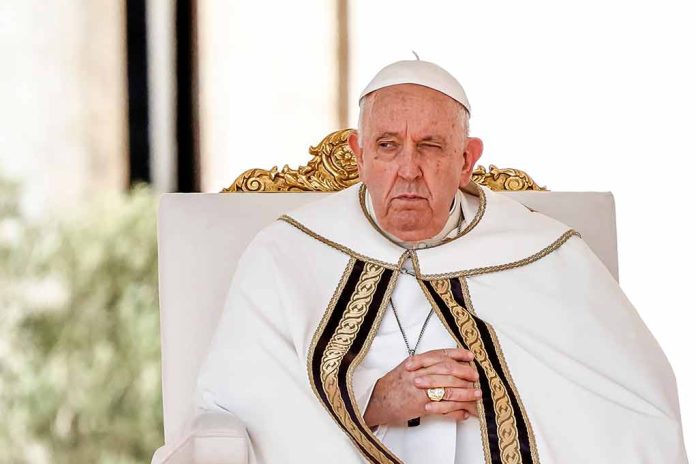
Pope Francis took a significant step by declaring the mpox virus a ‘global health emergency,’ urging the world to ensure fair vaccine distribution.
At a Glance
- Pope Francis declared mpox a global health emergency
- Africa is set to receive its first batch of vaccines soon
- Mpox causes flu-like symptoms and painful lesions
- The WHO and Africa CDC are urging swift vaccine distribution
Global Health Emergency Declared
Pope Francis has officially recognized the mpox virus as a global health emergency. This declaration highlights the urgent need for international intervention. The World Health Organization (WHO) has also declared the outbreak a global health emergency.
In response, Africa, notably the Democratic Republic of Congo (DRC), is set to receive its first batch of mpox vaccines. The outbreak has drastically risen in the DRC, reporting over 17,000 of the global 18,000 cases. African countries are awaiting approval for vaccine sale and distribution, heavily depending on donations from wealthier nations.
The Vaccine Distribution Challenge
The United States has committed to donating 10,000 vaccines across East Africa. Despite vaccines being available in over 70 countries, accessibility remains a challenge in African nations. Africa’s Centers for Disease Control (Africa CDC) estimates needing 10 million doses to control the outbreak.
“Helen Rees criticized the vaccine distribution delay to Africa, calling it ‘really outrageous’ and drawing parallels to the Covid-19 pandemic situation.”
The DRC has reported flu-like symptoms and painful pus-filled lesions among the infected. No confirmed cases of the new Clade 1 b strain, known to be more deadly, have been reported in the UK. Japan is sending 3.5 million doses, specifically for children in the DRC.
WHO declares mpox a global public health emergencyhttps://t.co/sfL12NJYSx
— Voice of America (@VOANews) August 15, 2024
Pope Francis’s Call for Solidarity
Pope Francis expressed his concern and solidarity with those suffering from mpox, particularly in the DRC. He encouraged local Churches, governments, and private industries to share technology and treatments to ensure that no one lacks adequate medical care.
“I pray for all the infected people, in particular the population of Democratic Republic of Congo, so affected, I express my closeness to the local churches most touched by this disease.”
WHO has asked mpox vaccine manufacturers to seek emergency licensing and advised continued donations until September. Outbreaks have been reported in Burundi, Kenya, Rwanda, and Uganda, along with a recent case in Sweden. The current mpox outbreak stems from the clade I strain, different and more severe than the clade II strain responsible for the 2022 global emergency.
Conclusion
Pope Francis’s declaration of mpox as a global health emergency underscores the urgent need for solidarity and action. The international community must ensure that affected countries, especially in Africa, have access to the necessary vaccines and treatments. This health crisis requires immediate attention to prevent further spread and loss of life.
“The current upsurge of mpox in parts of Africa, along with the spread of a new sexually transmissible strain of the monkeypox virus, is an emergency, not only for Africa, but for the entire globe.”
As Pope Francis urges global leaders to act, the world watches and hopes for a decisive and united response to this growing crisis.







